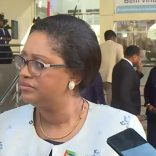Mozambique only authorizes hiring 4,142 workers for the civil service in 2025
EU gives Mozambique 734 million euros to strengthen rule of law

Lusa
The European Union (EU) yesterday gave its backing to a support program which establishes a 734 million euro fund to strengthen the rule of law and the quality of public finances in Mozambique through to 2020.
Speaking at a press conference in Maputo, Sven von Burgsdorff, EU ambassador to Mozambique, said: “We think that through this mechanism we can strengthen the rule of law in Mozambique and facilitate respect for human rights.”
The 11th European Development Fund agreement, signed on 26 November 2015, provides for EUR 734 million to be granted until 2020, of which 200 million will be directed to the Mozambican state budget.
About half of the fund will be directed to the area of governance, which, along with the rural development, is one of the two top funding priorities.
According to EU representation in Maputo, “EU support aims at strengthening the capacity of the state’s core systems, control mechanisms, internal accountability and macroeconomic management, helping to promote an enabling environment for political and economic governance”.
Last week, on the sidelines of the AU summit in Addis Ababa, Minister of Foreign Affairs and Cooperation of Mozambique, Oldemiro Baloi, and the European Commissioner for International Cooperation and Development, Nemen Mimica, signed the Agreement of Good Governance and Development as the legal basis for future general EU budget support for Mozambique.
EU donations represent on average, 16.5 percent of Mozambique’s foreign-aid general budget support since 2008, totalling 328 million euros over the last six years.
On the assessment of the impact of good governance funding, von Burgsdorff admitted that “in the first year you can not measure the results,” but expects the EU to disburse 54 million euros in the next few months as a “vote of confidence” in the goals to be established in February at a meeting with Minister of Economy and Finance, Adriano Maleiane.
“This first funding tranche seeks to improve aspects to what concerns public services, and addresses barriers to sustainable and inclusive growth,” von Burgsdorff says, pointing to consolidation and strengthening of the private sector as an important factor in creating employment opportunities in Mozambique.
The EU’s own evaluation of its 2014 Mozambique General Budget Support concludes that this method improves the management of public finances, governance and policy making, and has contributed to education, a “central aspect” of development.
“We can not solve all the problems of the country, but we want to support the government in addressing these issues,” noted von Burgsdorff, adding that the EU will also provide technical support for the management and control of funding.
Every year, the EU analyzes the performance of its aid packages, making new disbursements against satisfactory progress in the implementation of macroeconomic policies oriented towards stability, the improvement and reform of public finances and budgetary transparency.












Leave a Reply
Be the First to Comment!
You must be logged in to post a comment.
You must be logged in to post a comment.